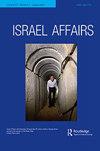寻求政治效力:2019-21年以色列议会选举中的以色列-阿拉伯选票
IF 0.6
4区 社会学
Q3 AREA STUDIES
引用次数: 1
摘要
摘要在2019年4月至2021年3月的四次以色列议会选举中,阿拉伯政治经历了戏剧性的动荡。首先是阿拉伯选民的投票率从2019年4月的极低(49.2%)跃升至2020年3月的20年来最高(64.8%),随后在2021年3月历史性下降至44.6%。阿拉伯政党经历了一段不稳定的时期——从2019年4月仅获得10个以色列议会席位的分裂政治体系,到2020年3月的选举中取得历史性成就,联合名单赢得了15个席位,随后又发生了一次分裂,在2021年3月选举中共获得10个席位。因此,联合名单的成就并没有预示着阿拉伯政党在阿拉伯街头的影响力得到加强,而是预示着公众对希望代表联合名单的政党的政治格局的影响力越来越大。公众和各方之间的相互关系是以色列阿拉伯社会在过去二十年中经历的深刻政治变革进程的结果。文章讨论了这些过程及其对阿拉伯公众政治行为的影响。本文章由计算机程序翻译,如有差异,请以英文原文为准。
Searching for political efficacy: the Israeli Arab vote in the 2019-21 Knesset elections
ABSTRACT Arab politics experienced dramatic upheavals in the four Knesset elections between April 2019 and March 2021. First was the jump from a significant low turnout among Arab voters in April 2019 (49.2%) to the highest turnout in two decades in March 2020 (64.8%), only to be followed by a historic slump to 44.6% in March 2021. The Arab parties went through a shaky period – from a divided political system that secured only 10 Knesset seats in April 2019 to a historic achievement in the March 2020 elections, when the Joint List won 15 seats, followed by yet another schism resulting in a total of 10 seats in the March 2021 elections. As such, the Joint List’s achievements did not herald the strengthening of the Arab parties’ influence in the Arab street but rather the increasing influence of the public on the political configuration of the parties wishing to represent it. The interrelation between the public and the parties is the outcome of profound processes of political change that Arab society in Israel has undergone over the past two decades. The article discusses these processes and their impact on the political behaviour of the Arab public.
求助全文
通过发布文献求助,成功后即可免费获取论文全文。
去求助
来源期刊

Israel Affairs
AREA STUDIES-
CiteScore
0.70
自引率
25.00%
发文量
65
期刊介绍:
Whether your major interest is Israeli history or politics, literature or art, strategic affairs or economics, the Arab-Israeli conflict or Israel-diaspora relations, you will find articles and reviews that are incisive and contain even-handed analysis of the country and its problems in every issue of Israel Affairs, an international multidisciplinary journal. Scholarly and authoritative, yet straightforward and accessible, Israel Affairs aims to serve as a means of communication between the various communities interested in Israel: academics, policy-makers, practitioners, journalists and the informed public.
 求助内容:
求助内容: 应助结果提醒方式:
应助结果提醒方式:


